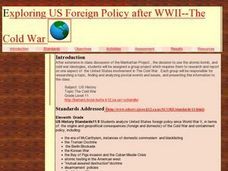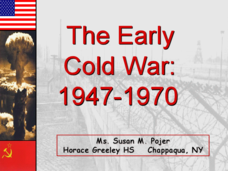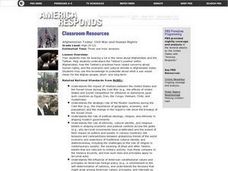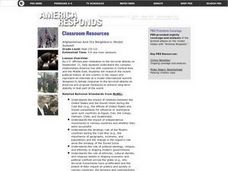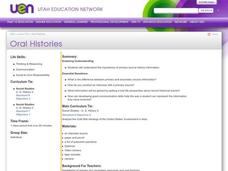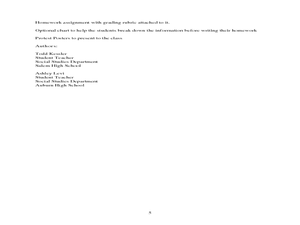Curated OER
Exploring US Foreign Policy after WWII--The Cold War
Scholars explore U.S. Foreign Policy and Cold War ideologies adopted after WWII. They conduct Internet research on a topic or issue related to the Cold War Era, watch two films, and compose a time line and a multimedia presentation to...
Curated OER
The Early Cold War: 1947-1970
With a combination of images, maps, and valuable information, this presentation is a strong resource for a history class that is coming out of a WWII unit and into a Cold War unit. Some points are outlined for students, while others are...
Curated OER
The Cold War (1945-1991): An Ideological Struggle
Covering the main topics of the Cold War, including some excellent discussion points on the methodologies of the Soviet and Eastern Bloc nations versus the US and Western Democracies, this presentation is a good way to introduce the...
University of California
The End of the Cold War (1979-1991)
Scholars use primary and secondary documents, as well as video evidence, to investigate the end of the Cold War. After completing the final installment of an eight-part series, class members better understand the issues surrounding the...
Curated OER
The Origins of the Cold War, 1945-1949
Learners investigate the early years of the Cold War and the origins of containment. Both supporters as well as critics are probed to examine the differences that emerged in the months following the end of the war in Europe. This unit...
Curated OER
Introduction to the Early Origins of the Cold War
In this Cold War worksheet, students read a 4-paragraph selection about post World War II diplomacy and then list key dates and events noted in the selection.
National Endowment for the Humanities
The Strategy of Containment, 1947–1948
How do people stop the spread of an ideology they don't think is right? Scholars research the policy of containment during the start of the Cold War. Small groups analyze primary sources to determine how the United States combated...
University of California
Principles vs. Practices
Have you ever wondered what your own World Order would look like? Scholars use primary and secondary documents as well as video clips to investigate and analyze the Cold War. Using the sources, the principles and practices of nations...
Foreign Policy Research Institute
Categories of Cold War Histiography
While the objective is to provide an overview of the Cold War in preparation for further study, this resource addresses the topic at a rather advanced level, and might need its own introductory lesson. The handouts include terms such as...
Curated OER
Afghanistan Today: Civil War and Human Rights
Students examine the relationship between the United States and the Soviet Union during the Cold War. They analyze the role of religion and cultural identity in shaping governments. They also examine the United States foreign policy.
University of California
Hot Spots Research Project
The Cold War was only between the US and the USSR, right? Wrong! Scholars use primary and secondary resources to analyze the global impact of the Cold War. The fourth installment of an eight-part series culminates in the creation of a...
Curated OER
1950's Popular Culture
Young scholars gain a basic understanding of Capitalism and Communism, the ideologies that fueled the United States and the Soviet Union during the Cold War.
Smithsonian Institution
Cuban Missile Crisis
The United States—specifically John F. Kennedy—played a large role during the Cuban Missile Crisis. A history resource poses questions that encourage critical thinking as well as in-depth analysis of images from the time period.
Curated OER
Afghanistan and Its Neighbors: Model Summit
Students examine the relationship between the United States and the Soviet Union during the Cold War. They discover the role of religion and cultural identity in the war in Afghanistan. They explore the arguments for and and against...
Curated OER
McCarthysim
Eleventh graders explore and analyze the impact of the Cold War at home and how the fear of communism and nuclear war affected American life throughout the Cold War. They study what role Senator Joseph McCarthy played on American fears...
Curated OER
Korean And Vietnam Conflicts: Similarities And Differences
Eighth graders study the historical significance of the Korean and Vietnam Wars in this unit of study. They investigate the different ideologies that were involved and examine the effect of the wars on local veterans.
Curated OER
Oral Histories
Distinguish the difference between primary and secondary sources. High schoolers discover how to conduct an interview using an individual as a primary source, and why it is important to get a real-life perspective. They either video or...
Curated OER
Mixed Prepositions 19
In this mixed prepositions lesson, students consider choices of prepositions from a drop-down list in order to complete the sentences in a paragraph.
Curated OER
1968 – A Generation in Revolt
Tenth graders compare and contrast the revolts that took place around the world in 1968. In this global studies lesson, 10th graders research the youth revolts that took place in Paris, Prague, and Chicago in 1968 and create posters and...
Curated OER
History: I'm Watching You 24/7
Students examine the growth of authoritarian societies. Focusing on North Korea, they watch video clips looking for examples of totalitarianism and identify the problems there. They write letters to the editors of local newspapers...
Curated OER
Changing Circumstances, Changing U.S. Foreign Policy
Students examine how relationships between countries change overtime. They identify the factors that play a role in altering the relationships and contribute to U.S. foreign policy toward their country of research. Groups conduct their...
Curated OER
Capitalism and Communism: What's the Difference?
Learners discover the differences between capitalism and communism. They participate in a simulation activity in which they examine Marx's philosphy of communism. They also examine Zapatista communities.


